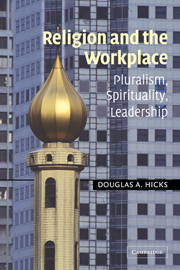Book contents
- Frontmatter
- Contents
- Acknowledgments
- Introduction
- PART I ANALYZING CURRENT REALITIES
- 1 The changing American context
- 2 The corporate interest in spirituality
- 3 Which spirituality in the workplace?
- 4 Conflicts at work: is religion distinctive?
- PART II MAPPING RELIGION AND THE WORKPLACE
- PART III CONSTRUCTING RESPECTFUL PLURALISM
- Bibliography
- Index
2 - The corporate interest in spirituality
Published online by Cambridge University Press: 02 December 2009
- Frontmatter
- Contents
- Acknowledgments
- Introduction
- PART I ANALYZING CURRENT REALITIES
- 1 The changing American context
- 2 The corporate interest in spirituality
- 3 Which spirituality in the workplace?
- 4 Conflicts at work: is religion distinctive?
- PART II MAPPING RELIGION AND THE WORKPLACE
- PART III CONSTRUCTING RESPECTFUL PLURALISM
- Bibliography
- Index
Summary
Since the late 1980s, interest in spirituality and leadership has mushroomed. Books, magazines, and videos on spirituality at work or spirituality for business leaders have become a tremendously profitable industry for publishers. Parachurch and other new organizations have joined “corporate chaplains” in bringing faith to the office. “Consultants” and “corporate trainers” from a variety of perspectives – New Age, Christian, Buddhist, Hindu, interfaith, and every combination thereof – have built a specialty field.
Scholars refer to the developments since the late 1980s not merely as a trend, but as a movement. How and from where did this new (or resurgent) interest arise? Is it a result of positive societal and corporate changes that have led to a discovery of a spiritual dimension of work? Are there reasons to be concerned about this so-called movement because it results from, or exposes, other more troubling developments in work and society?
Scholars from many disciplines and approaches have pointed out a vast array of factors which may have affected the current interest in workplace spirituality and religion. These factors include demographic and religious changes in US society, overall improvements in the US standard of living, and a variety of transformations in the workplace itself. This chapter suggests that no single cause or simple answer can account for the phenomenon and that many different elements have played some part in focusing attention on spirituality and religion in organizations.
- Type
- Chapter
- Information
- Religion and the WorkplacePluralism, Spirituality, Leadership, pp. 27 - 47Publisher: Cambridge University PressPrint publication year: 2003



